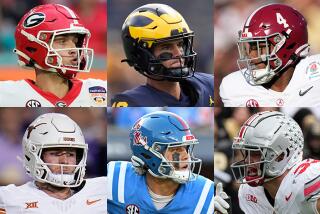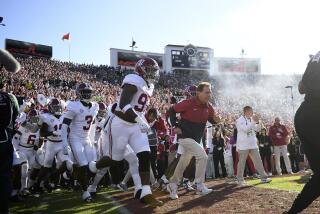TEN TO REMEMBER
- Share via
No top-10 season recap of the college football season would be complete without citing Oregon State’s upset win over USC, or the havoc the new clock rules created on coaches, or Nick Saban failing the lie-detector test at Miami and signing with Alabama for $32 million.
Except this one, because those stories didn’t make our year-end cut.
1
Florida
Florida football celebrated its 100th anniversary with its second national title, a 41-14 Gator-romp over highly favored Ohio State in the Bowl Championship Series national title game.
It was a shocking result for everyone except the Gators, who got tired of hearing for a month they had no chance against an Ohio State team that started celebrating 59 minutes 44 seconds too early after Ted Ginn Jr. ran the opening kickoff 93 yards for a touchdown.
Florida responded by scoring the next 21 points while the much-faster Gators defense made Troy Smith, this year’s Heisman Trophy-winning quarterback, look like a seventh-round draft choice. Smith was held to six yards rushing and passing and completed only four of 14 passes.
2
Boise State
The Broncos capped a 13-0 season with an overtime win against Oklahoma in the Fiesta Bowl that many are calling the best college football game ever.
It wasn’t just the fact that Boise State won, it was how it won, scoring the game-winning, two-point conversion in overtime on a Statue-of-Liberty handoff from quarterback Jared Zabransky to tailback Ian Johnson. Moments after Johnson heaved the ball into the stands, he proposed marriage to his girlfriend on life television.
She said “yes.”
The final minutes of the game were spellbinding, as it appeared Boise State was going to lose after Marcus Walker stepped in front of a Zabransky pass and returned the interception for the go-ahead touchdown with 1:02 left.
Boise State history, though, had yet to be written.
3
Bo dies
This season’s Ohio State-Michigan game had enough build-up as the schools approached their No. 1 vs. No. 2 showdown in Columbus, Ohio.
The weekend took on a whole new meaning, though, when the day before the game, Nov. 17, former Michigan Coach Bo Schembechler died at 77 of heart failure while taping a weekly television show in Detroit.
Schembechler and Woody Hayes, his late counterpart, embodied the Michigan-Ohio State rivalry with a decade-long battle that would become called “The 10-Year War.” Schembechler was born and raised in Ohio, and coached under Hayes at Ohio State, but once he got to Michigan, in 1969, he was a “Michigan Man.”
4
What is a Rutgers?
That was the question posed by an out-of-town writer at a time when Rutgers football was as laughable as it was forgettable.
No more.
A school that had been the butt of a thousand jokes rose out of obscurity to post an 11-2 season and its first bowl victory.
Rutgers, led by Jersey-guy Greg Schiano, capped a storybook season by defeating Kansas State in the Texas Bowl. Rutgers, credited with playing the first intercollegiate football game, in 1869 against Princeton, had lost two previous bowls to the same team, Arizona State.
The highlight of the season was a 28-25 home win against Louisville in early November that left Rutgers, at that moment, as one of only four unbeaten teams.
5
The Great Debate
Which team deserved to play Ohio State for the national title: Michigan or Florida?
That was the question Dec. 2 after UCLA upset USC in the Rose Bowl.
The USC loss threw the battle for No. 2 in the BCS into a points contest and a political campaign. One-loss Michigan was third in the BCS and thought it should jump into the second spot and earn a rematch against Ohio State. Florida also had only one loss, to Auburn. The BCS computers had Florida and Michigan tied so it was left to voters in the Harris and USA Today coaches’ polls to decided the outcome. Enough voters jumped Florida over Michigan to allow the Gators to grab the No. 2 spot by the narrowest of margins: .9445 to .9344.
6
Wake Forest
With an undergraduate enrollment of about 4,000, Wake Forest became the smallest school ever to earn a BCS bowl bid. The Demon Deacons were picked to finish last in the Atlantic Coast Conference’s Atlantic Division.
They finished first.
They were 11-3.
They won their first conference title in 36 years.
The pinnacle came Nov. 11, when Wake Forest went into Tallahassee and beat Florida State, 30-0, the first time Bobby Bowden had been shut out at home in his 31 years at the school.
7
Pac-10 refs
Ugly, ugly, ugly, is the only way to describe the end of the Oregon-Oklahoma game in Eugene, Ore., on Sept. 16. A botched onside kick call by the Pacific 10 Conference officiating crew altered the course of Oklahoma’s season and prompted school President David Boren to ask that the game be stricken from the records.
That was never going to happen, but it was a bad call. Trailing, 33-27, Oregon tried an onside kick that clearly touched a Ducks player before the ball traveled the required 10 yards.
The ball should have been awarded to Oklahoma. Replay official Gordon Riese, who later said he did not have the correct camera angle, upheld the decision on the field and Oregon won on a touchdown with 46 seconds left. The entire Pac-10 officiating crew was suspended for a game, and Riese was granted a leave of absence and eventually retired.
8
UCLA 13, USC 9
Never underestimate the power of a rivalry. USC had defeated its cross-town rivals seven consecutive years and needed to defeat the Bruins on Dec. 2 to advance to the BCS national title game. Oops. UCLA first-year defensive coordinator DeWayne Walker, a former assistant on Pete Carroll’s USC staff, called a brilliant game and had the Trojans’ offense bottled up all game. UCLA clinched the win when Eric McNeal deflected a John David Booty pass and made a spectacular interception at the UCLA 20. USC had scored at least 20 points in 63 previous games.
9
The Brawl
The on-field fight that erupted between Miami and Florida International in the Orange Bowl on Oct. 14 was an embarrassment to the schools, college football, the players who played in the game, the coaches who coached in it and one announcer who announced it.
The brawl probably sealed the fates of the presiding head coaches, Larry Coker of Miami and Don Strock of Florida International, whose services were no longer required at the end of the season.
Former Miami receiver Lamar Thomas, part of the team broadcasting the game, lost his job and embarrassed himself when he lauded Miami’s role in the third-quarter melee. “That’s what I’m talking about,” Thomas said.
Thirteen players were ejected from the game, called the “City Line Series” because the South Florida schools are separated by only nine miles.
Miami won the game, 35-0, but not much else. Florida International had little credibility to start with. The school eventually handed out three dozen suspensions and a stack of apologies.
10
Comeback Bowl
Texas Tech 44, Minnesota 41: This instant Insight Bowl classic gets somewhat lost in the bowl buzz because it was played in the Phoenix area, three days before Boise State worked its magic against Oklahoma in the Fiesta Bowl.
All Texas Tech did Dec. 29, at Sun Devil Stadium, was stage the biggest comeback in Division I-A bowl history by rallying from a 31-point, third-quarter deficit to beat Minnesota in overtime.
Texas Tech sent the game to overtime on Alex Trlica’s 52-yard field goal at the end of regulation, and won it on Shannon Woods’ three-yard touchdown run in overtime after Minnesota had managed only a field goal on its overtime possession.
Texas Tech Coach Mike Leach was overcome with emotion after the game.
Minnesota Coach Glen Mason was fired.
More to Read
Go beyond the scoreboard
Get the latest on L.A.'s teams in the daily Sports Report newsletter.
You may occasionally receive promotional content from the Los Angeles Times.











